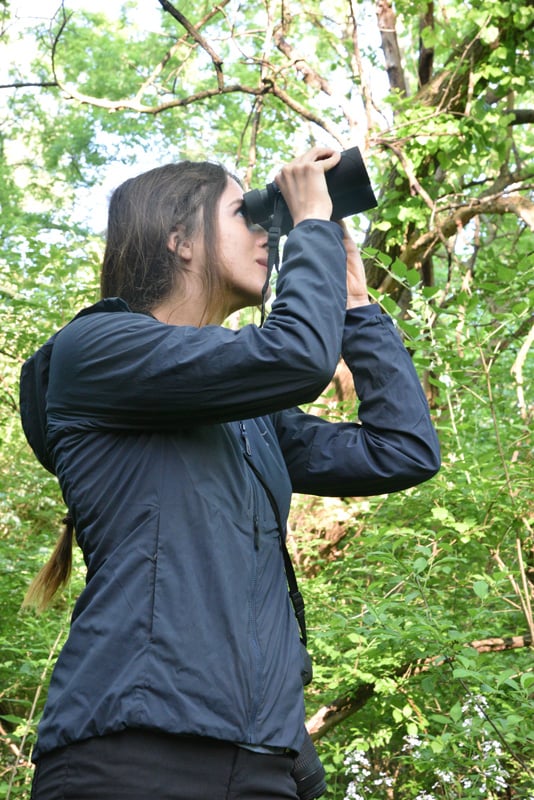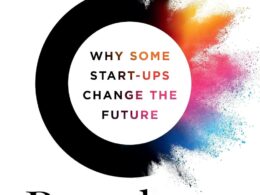Rather than follow a conventional path, Madison Bachman pursued a life of passion studying human-primate co- habitation in South Africa in order to find solutions to a growing problem: The battle for existence.
By sharing her story, Bachman reminds us that the power of pursuing one’s passion in life and living a life of purpose and fulfillment can result in magical and impactful outcomes. In spring 2019, after graduating from the University of Michigan with a degree in cell and molecular biology and biomedical engineering, she was ready to start her medical training.
And yet, Bachman says there was a burning question she couldn’t shake. “Do I follow what society would suggest as the right path for my life, or do I pursue what I believe is the right course for me?”
Bachman found herself living in what she calls the “space between stories,” a transitional phase between her old story and a new one. “During this time, I found myself deconditioning what society told me I ought to be and looking back to my childhood self and asking her who I was meant to be,” Bachman says.
Sign Up: Receive the StartupNation newsletter!
Based on her reflections, she took a leap and embraced her lifelong dream and passion. “My 5-year-old self was, and still is, in love with the outdoors, with nature, and wildlife,” she says. “I knew I had to start with myself.”
Last August, Bachman began working as a field researcher for Duke University. The work entailed a six-month research project in South Africa studying the conflict of human and baboon coexistence, specifically in the Montane Forest region.
Once there, she followed a troop of baboons from sunrise to sunset, observing and recording their behaviors. Her goal was to determine why the human and baboon populations, which once lived in perfect harmony, now lived contentiously in the region.
What she learned was that human settlements along the Garden Route of South Africa replaced much of the grassland landscape. Many baboons, who once called those grasslands home, were forced to relocate to the Montane Forest.
Related: How to Crack Your Life’s Purpose and Unlock Your True Calling
As the human population continued to grow and expand, the Montane Forest began shrinking. And as the forest shrank, leopards, which are the only natural predator of baboons in the area, fled, causing the baboon population to explode. Coupled with a shrinking habitat, food became more scarce and competition violent.

As a result, the baboons entered human settlements in search of food from gardens and farms, posing a great risk to their lives and creating the perfect storm for intense human-wildlife conflict.
Out of that setback, though, an opportunity arose. One day, Bachman was observing the baboons out in the crop fields when suddenly a local farmer began shooting at the troop.
“As I ran, I looked back to see that one of the male baboons I had been observing had been shot, and the entire troop rushed past me to the forest edge to seek refuge deep within, faster than I could follow,” she recalls.
She spent the next few days searching for her troop. Three days later, she found 20 of the 60 members, and soon after her colleague found the rest. “When I rejoined the troop, I could feel their sense of distress,” she says. “(And) in that moment, I made a commitment to go beyond conducting research to finding and implementing solutions.”
On that day, she laid plans to form the Wild Alliance, a not-for-profit international organization based in the Garden Route of South Africa and registered in the United States.
“Our mission is to improve human-wildlife coexistence, starting with human-baboon conflict in South Africa, but ultimately (the intention is) to address these issues on a global scale,” Bachman says. “Our vision is a world where wildlife and wild places are protected, and the human communities surrounding these areas have the necessary support to live in harmony with nature and the local primate inhabitants.”
The organization embraces innovation, education, ecological research, and natural landscape restoration. In turn, Wild Alliance strives to dissolve the existing boundary between “them and us,” while restoring interspecies connection.
In August, Bachman plans to return to the jungles of South Africa to continue her research. “Once that connection is restored, a new relationship between humans and wildlife can be built, one that is founded on mutual respect, allowing us to coexist peacefully,” she says. “Which is the more beautiful world our hearts know is possible.”
Originally published Sept. 21, 2020, in DBusiness, and Oct. 30, 2020, on StartupNation.





